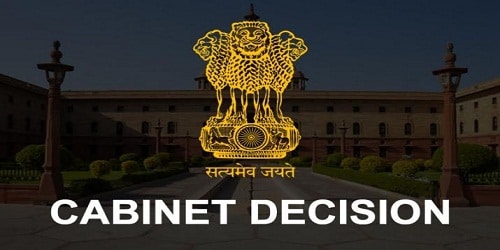The Cabinet Committee on Economic Affairs (CCEA) Chaired by the Prime Minister Shri Narendra Modi has approved the following proposals on December 24, 2019. The approval in detail are as follows: Cabinet approved conducting Census of India 2021 and updating National Population Register:
Cabinet approved conducting Census of India 2021 and updating National Population Register:
The CCEA has approved to conduct Census of India which is the largest administrative and statistical exercise in the world will be conducted in the year 2021(16th census) with a cost of Rs. 8,754.23 crores. It has also approved to update the National Population Register (NPR) at a cost of Rs. 3,941.35 crores.
i.Census coverage: The census will cover entire India but the NPR will cover all regions in the country except Assam. House listing and Housing Census under NPR will also not be conducted in Assam.
ii.2021 census phase: the upcoming 2021 census will be conducted in 2 phases:
- House listing and housing census which will be conducted from April to September, 2020 and
- Population enumeration which will be conducted from 9th February to 28th February, 2021.
iii.Census implementation:
- Over 30 lakh field functionaries will complete this census exercise that became up from 28 lakhs in 2011.
- Mobile app for data collection and the Central portal for monitoring purposes will be used and is expected to improve the census quality.
- Census-as-a-service (CaaS) will deliver on-demand data to ministries whenever needed. The data will be delivered in a clean, machine-readable and actionable format.
- The conduct of census and updation of NPR will directly or indirectly lead to job generation. Approximately 48,000 manpower will be engaged for about 2,900 days at the local levels. This means that around 2.4 crore man-days employment would be generated.
iv.Implementation strategy and targets:
Census process will be done by enumerators, generally government teachers and appointed by the state govts. They will do work of NPR along with census by visiting each and every household.
v.New initiative in Census 2021: Some of the new initiatives undertaken for the Census 2021 are as follows:
- Mobile App usage for the1st time for data collection.
- Usage of census monitoring & management portal as a single source for all officers/ officials involved in Census activities to provide multi language support.
- Creating facility for online self-enumeration for public during population enumeration phase. Code directory will be created to record descriptive responses as a way of saving time.
- Transfering honorarium to Census functionaries directly to their bank accounts through Public Financial Management System (PFMS) and Direct Benefit Transfer (DBT) covering more than 60% of the total expenditure.
- Providing qualitative training to 30 lakh functionaries.
vi.Census background:
- The census has been conducted in India since 1872 without outbreak. It is conducted every 10 years.
- 2021 is not only the 16th census but also 8th after independence.
- The Census Act, 1948 and the Census Rules, 1990 provide the legal framework in conducting the Census.
vii.NPR background:
- The NPR was prepared in 2010 under the provisions of the Citizenship Act, 1955 and Citizenship Rules, 2003.
- It was subsequently updated in 2015 by seeding it with Aadhaar.
Cabinet approved to create post of Chief of Defence Staff in the rank of four-star General:
The CCEA has approved to create the post of Chief of Defence Staff (CDS) in the rank of a 4-star General with salary and benefits equivalent to a Service Chief. The CDS will also head the Department of Military Affairs (DMA), which will be created within the Ministry of Defence(MoD) and function as its Secretary.The proposal for setting up a CDS has been done around 20 years ago after the Kargil war of 1999 by the K. Subrahmanyam committee.
i.Areas dealt by Department of Military Affairs headed by CDS:
The areas include
- Armed Forces of the Union. The armed forces are the Army, the Navy and the Air Force.
- Integrated Headquarters of the MoD Comprising Army Headquarters, Naval Headquarters, Air Headquarters and Defence Staff Headquarters.
- Territorial army & works related to Army, Navy and Air Force.
- Procurements exclusive to the services except capital acquisitions, as per prevalent rules and procedures.
ii.Other functionality: The CDS will also be the Permanent Chairman of the Chiefs of Staff Committee and act as a Principal Military Adviser to the defence minister on all tri-Services matters. The 3 chiefs of Army, Navy and AirForce will however continue to advise the defence ministers.
iii.CDS functions as a permanent chairman of Chiefs of Staff Committee: The following are the functions of CDS as a permanent chairman of Chiefs of Staff Committee.
- Tri-services organisations administration. The organisations related to Cyber and Space will also be under the command of the CDS.
- CDS will be the member of Defence Acquisition Council chaired by the defence minsiter and Defence Planning Committee chaired by National Security Advisor(NSA).
- Functioning as Military advisor to Nuclear Command Authority.
- Implementing 5-year Defence Capital Acquisition Plan (DCAP), and 2-year roll-on Annual Acquisition Plans (AAP), as a follow up of Integrated Capability Development Plan (ICDP) etc.
iv.CDS creation announcement: The creation of the post of CDS was announced by the Prime Minister on 15th August 2019. Click here to know more.
Cabinet approved transformational Organisational Restructuring of Indian Railways:
The CCEA has approved for transformational organisational restructuring of the Indian Railways(IR). This reform will help in achieving Government’s vision of making IR the growth engine of India’s vikas yatra.
i.Reform: The reforms include
- Grouping the currently existing 8 Group A services of IR into a central service known as Indian Railway Management Service (IRMS).
- Existing Indian Railway Medical Service (IRMS) will be renamed as Indian Railway Health Service (IRHS).
ii.Unification of the 8 Group A services:
- The Railway board will no longer be organised on departmental lines, and replaced with a leaner structure organised on functional lines. It will be headed by CRB (Central Railway Board) who will act as the Chief Executive Officer (CEO) with 4 members and some independent members.
- This unification of services was undertaken at 2-day conference “Parivartan Sangoshthi” held on 7th & 8th December, 2019 in New Delhi.
- Unification of services has been recommended by various committees for reforming Railways. It includes Prakash Tandon Committee (1994), Rakesh Mohan Committee (2001), Sam Pitroda Committee (2012) and Bibek Debroy Committee (2015).
- The unified service will be created in consultation with DoPT (Department of Personnel and Training) and UPSC (Union Public Service Commission). The process will be completed in a year.
iii.Reorganised railway board headed by CRB ie., CEO:
- The chairman who is the CEO will be the cadre controlling officer responsible for Human resources (HR) with assistance from a DG (HR).
- 3 posts will be surrendered from Railway Board and remaining post will be open to officers regardless of the service they belong.
iv.Railways programme:
- The IR aims to modernise & also provide the highest standards of safety, speed etc to the passengers with a proposed investment of Rs. 50 lakh crore over the next 12 years.
v.IR: The IR is managed by the central govt directly and is organised into various depts like Traffic, Civil, Mechanical, Electrical, Signal & Telecom, Stores, Personnel, and Accounts etc which are headed by Secretary level officer (Member] in the Railway Board. Click here to know more
Cabinet approved transfer of administrative control of Brahmaputra Cracker and Polymer Ltd:
The CCEA has approved the transfer of administrative control of Brahmaputra Cracker and Polymer Limited (BCPL) to Ministry of Petroleum & Natural Gas(MoPNG) from the Department of Chemicals & Petrochemicals. The BCPL is Central Public Sector Undertaking implementing the Assam Gas Cracker Project (AGCP). The detailed approval are as follows:
i.Feedstock subsidy to BCPL for 15 years of plant operation. This is done to maintain minimum Internal Rate of Return (IRR) of 10% (post tax).
ii.To bring the IRR to 10%, Rs 4600 crores has been estimated for the 15-year plant operation.
iii.Proposals will be submitted on a yearly basis from next financial year (2020-21) and the administrative ministry will examine the proposal with Finance Ministry (FM) consultation.
iv.Committed quantity and quality of feedstock to the project will be made by the MoPNG as envisaged in the earlier CCEA approval of 2006.
v.The project is seen as a part of the implementation of Assam accord and will help in the development of the north east region.
Cabinet approved funds to the tune of Rs. 627.40 crore for 10 projects under Swadesh Darshan Scheme:
The CCEA has approved to release funds to the tune of Rs. 627.40 crore for 10 projects sanctioned during 2018-19. It also approved an additional Rs. 1854.67 crores for sanctioning new projects during 2019-20 under Swadesh Darshan Scheme.
Swadesh Darshan Scheme:
- Under the Swadesh Darshan Scheme, the tourism ministry develops tourism infrastructure to make India, a world class tourist destination.
- The scheme was launched in January, 2015 by the Ministry of Tourism(MoT) as the announcement made in the 2014-15 budget.
- 15 circuits have been identified for development under the scheme. They include Himalayan Circuit, North East Circuit, Krishna Circuit, Buddhist Circuit and Coastal Circuit, Desert Circuit, Tribal Circuit, Eco Circuit, Wildlife Circuit, Rural Circuit, Spiritual Circuit, Ramayana Circuit, Heritage Circuit, Tirthankar Circuit and Sufi Circuit.
Cabinet approved official amendments to the Arms (Amendment) Bill, 2019:
The CCEA has given its ex-post facto approval for the official amendments to the Arms (Amendment) Bill, 2019 which was moved and passed by the Lok Sabha on December 9th, 2019.
i.Bill benefits:
- The bill would prevent perpetrators from indulging in illegal arms and ammunition trade and manufacturing.
- Law abiding license holders will be facilitated with increased duration of arms licence.
- The bill would be a step forward in providing licence in electronic form longer with validity period of licenses and stricter regulatory mechanism.
Cabinet approved Promulgation of the Insolvency and Bankruptcy Code (Amendment) Ordinance, 2019:
The CCEA has given its approval to promulgate an Ordinance to amend the Insolvency and Bankruptcy Code, 2016. This amendment will remove ambiguities in the Insolvency and Bankruptcy Code, 2016 and will also ensure smooth implementation of the code.
Amendment features:
- The liability of a corporate debtor will be ceased for an offence committed prior to the commencement of the corporate insolvency resolution process.
- The corporate debtor will not be prosecuted for such an offence from the date the resolution plan has been approved by the Adjudicating Authority, if the resolution plan results in change of management or control of the corporate debtor to a person who was not:
- promoter or in the management or controlling the corporate debtor or a related party of such a person; or
- A person with regard to whom the relevant investigating authority has, on the basis of material in its possession, and has submitted or filed a report/complaint to the relevant statutory authority or Court.
Cabinet granted Ex-post facto approval to amend the Bengal Eastern Frontier Regulations:
The CCEA has given its ex-post facto approval to the Adaptation of Laws (Amendment) Order, 2019 issued by the President under clause (2) of article 372 of the Constitution to amend the Bengal Eastern Frontier Regulations (BEFR), 1873.
- This notification will extend the BEFR to Manipur to give protection to its indigenous people from the provisions of Citizenship Amendment Act, 2019 and also would make necessary changes in the said Regulation.
About Union Cabinet:
The Union Council of Ministers exercises executive authority in India. It consists of senior ministers called cabinet ministers, junior ministers called ministers of state and, rarely, deputy ministers. It is led by the Prime Minister.





